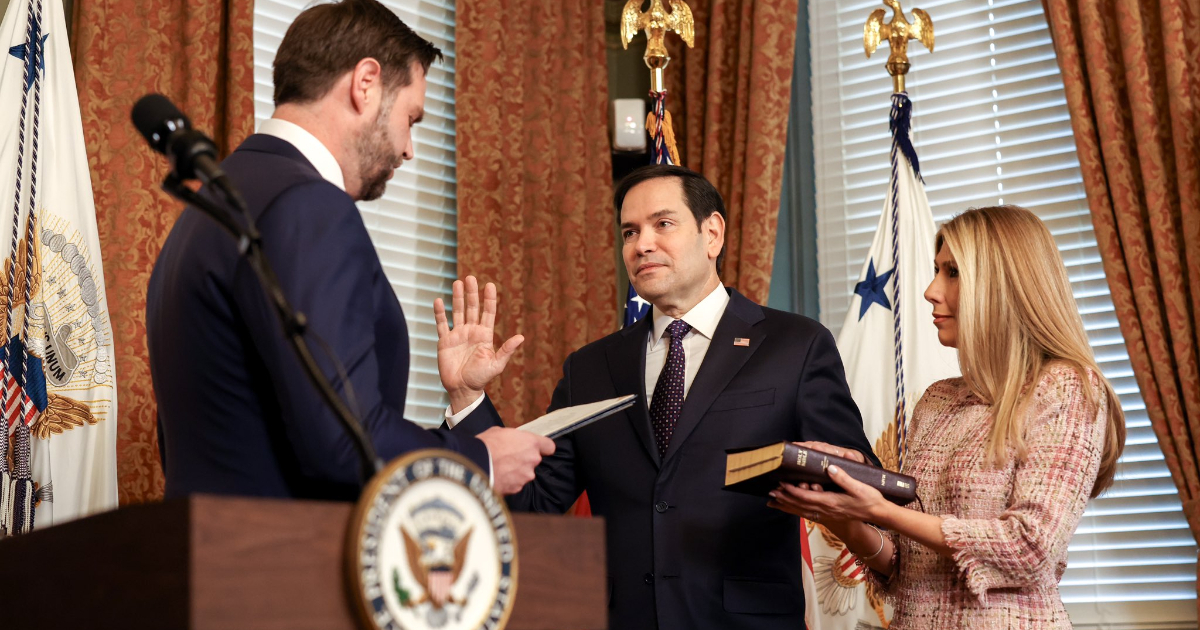
Related videos:
The newly appointed Secretary of State of the United States, Marco Rubio, outlined the guidelines of the country's new foreign policy, focused on three fundamental pillars: security, strength, and prosperity.
In a recent statement, Rubio expressed his gratitude to President Donald Trump for the trust placed in him to lead the State Department. In this regard, he emphasized that every decision in foreign policy should answer one of the following questions: "Does this make the United States a safer country? Does this make the United States stronger? Or does this make the United States more prosperous?".
The confirmation of Rubio as Secretary of State was unanimous in the Senate, with 99 votes in favor, reflecting broad bipartisan support for his appointment. During his confirmation hearing, Rubio emphasized the necessity of strictly adhering to the "America First" policies promoted by the Trump administration.
Regarding policy towards Latin America, Rubio has been a consistent critic of authoritarian regimes in the region. He has labeled the Mexican cartels as terrorist organizations and has identified Cuba as a state sponsor of terrorism.
These stances suggest a possible tightening of U.S. policy towards these countries under its leadership at the State Department. Venezuela is another country for which the current administration seems to have a clear strategy to remove the Nicolás Maduro regime from power and promote a peaceful transition to democracy.
The Russian invasion of Ukraine
Regarding the war in Ukraine, Rubio has stated that the official policy of the United States will be to work towards ending the conflict and promoting peace.
In this delicate matter, crucial for the security of Western democracies, the current administration seems to have nuanced Trump's statements, who, leveraging his closeness and communication with Vladimir Putin, repeatedly claimed that he would end the conflict in an instant, something that now appears to be more complicated, as is appropriate for a conflict of such magnitude.
Analysts indicate that a Russian victory in Ukraine could undermine the prestige of the United States and strengthen other authoritarian regimes. Arseniy Yatsenyuk, former Ukrainian Prime Minister, argues that maintaining support for Ukraine is crucial to prevent the weakening of global security and to reinforce American leadership.
The complex challenge of China
In relation to China, the current Secretary of State has warned that it is the "greatest threat" to the United States, highlighting the need for substantial changes in policies to mitigate this danger. He has advocated for the importance of NATO and emphasized the necessity for European allies to contribute more to their own defense.
As a member of the Senate Foreign Relations Committee, Rubio has gained firsthand knowledge of reports indicating that China has established spying bases in Cuba, which poses a direct threat to the national security of the United States.
These facilities would allow China to intercept communications and monitor activities on American soil, escalating tensions between the two countries. Additionally, the presence of Chinese spy balloons over U.S. airspace has raised further concerns about Beijing's surveillance capabilities.
The challenge of Iran and peace in the Middle East
Iran represents another major challenge for U.S. foreign policy under Rubio's leadership. The Tehran regime has been accused of financing and supporting terrorist groups like Hamas and Hezbollah, contributing to instability in the region.
The recent war between Israel and Hamas in Gaza has highlighted Iran's role as a key player in the conflict, providing weapons and funding to these groups. Rubio has expressed his commitment to maintaining a firm stance against Iran, advocating for stricter sanctions and strengthening alliances with strategic partners like Israel and Saudi Arabia to counter Iranian influence.
The conflict between Israel and Hamas has raised concerns in the international community, as it could trigger a regional escalation involving other actors such as Hezbollah in Lebanon or even pro-Iranian militias in Syria and Iraq.
Rubio has emphasized the importance of ensuring Israel's security and has noted that any peace agreement in the region must address the threat posed by Iran.
Additionally, he has emphasized the need to strengthen the Abraham Accords, promoted by the Trump administration, as a way to consolidate cooperation between Israel and its Arab neighbors in an effort to curb the expansion of Iranian influence in the Middle East.
Latin American Dictatorships and Their Strategic Alliances
In Latin America, countries such as Cuba, Venezuela, and Nicaragua, governed by authoritarian regimes, have strengthened their ties with powers such as Russia, China, and Iran.
These alliances seek to expand their geopolitical interests, often in opposition to those of the United States. The military and economic cooperation between these countries and the mentioned powers poses challenges for U.S. influence in the region.
Moreover, the political and economic instability in these countries has led to waves of migration to the United States, a phenomenon that has significantly influenced the radical policy shift of the new Trump administration, which canceled the CBP One system and humanitarian parole on his first day in office, among other measures from the previous administration.
The foreign policy outlined by Rubio aims to tackle these challenges through a strategy that prioritizes the security, strength, and prosperity of the United States. However, the complexity of international issues will require skilled diplomacy and strategic alliances to protect national interests and promote global stability.
On its part, the Cuban-American community has welcomed Rubio's appointment with optimism. Congressman Mario Díaz-Balart described the designation as "a historic moment" and emphasized that there is no one better prepared to keep America safe than Marco Rubio.
A foreign policy based on those three fundamental pillars of security, strength, and prosperity must address the international challenges facing the nation, among which the Russian invasion of Ukraine, the growing influence of China, and the alliances of authoritarian regimes in Latin America stand out.
Filed under: